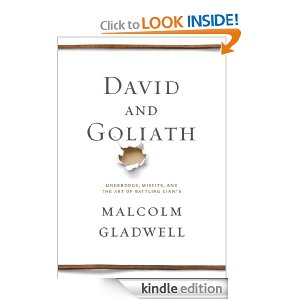When I was growing up one of my favorite Biblical stories was David and Goliath. Okay, so it didn’t work out so well for Goliath or the Philistines. But it’s a story a kid can understand and appreciate. And the message was clear: David was an underdog who overcame a giant enemy through his faith and trust in God. Right?
Well, maybe. Renowned author and thinker Malcolm Gladwell has come out with the new book David and Goliath: Underdogs, Misfits, and the Art of Battling Giants to rethink the role of underdogs in our society. He describes certain disadvantages as being “desirable difficulties” that can force us to learn new ways to achieve our goals.
David had a desirable difficulty — there was no way he could compete with the giant Goliath in a traditional fight. So he had to find a different approach, one that broke the rules a bit. By thinking out of the box and using a sling as a military technology, David the underdog overcame the favorite.
While understanding most underdogs will lose, Gladwell’s research focuses on how shortcomings — whether intellectual, physical, social or economic — can be the necessary ingredient to push people into new forms of achievement. Perhaps the most startling example of this is the number of Fortune 500 CEO’s who were diagnosed with dyslexia but managed to climb to the top of their profession anyway. Their reading difficulties forced them to learn in new ways, and those methods proved extremely effective at furthering their careers.
Another example, Gladwell points to research showing that the top tier graduates of a mediocre college are often more successful than the middle tier graduates of an elite school, even though the former were well behind the later when entering college. The reason? Attending an elite school can make a great student feel mediocre when they compare themselves to their brilliant peers. The desirable difficulty of having lower SAT scores allowed these students to be a big fish in a small pond, which gave them the confidence needed to excel after graduation.
As with all of his books, Gladwell will be criticized for selecting only those research results that fit his hypothesis. But equally true is that his ideas ring true to the reader and feel consistent with our own experiences. That’s not the same thing as empirical proof, of course, but it sure makes for a fun read that prompts our minds to rethink the obvious. For that reason alone the book is well worth reading.


